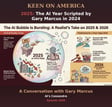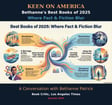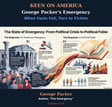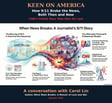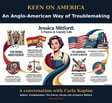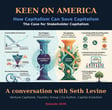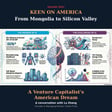
Episode 2242: Gary Gerstle identifies the outlines of our Post Neoliberal Age
As the author of The Rise and Fall of the Neoliberal Order, the Cambridge University historian Gary Gerstle was one of first people to recognize the collapse of neoliberalism. But today, the real question is not about the death of neoliberalism, but what comes after it. And, of course, when I sat down with Gerstle, I began by asking him what the Trump victory tells us about what comes after neoliberalism.
Gary Gerstle is Paul Mellon Professor of American History Emeritus at the University of Cambridge. Gerstle received his BA from Brown University and his MA and PhD from Harvard University. He is the author, editor, and coeditor of more than ten books. He is currently the Joy Foundation Fellow at the Harvard-Radcliffe Institute, Harvard University, where he is working on a new book, Politics in Our Time: Authoritarian Peril and Democratic Hope in the Twenty-First Century. He resides in Cambridge, Massachusetts.
Named as one of the "100 most pivoted men" by GQ magazine, Andrew Keen is amongst the world's most pivotal broadcasters and commentators. In addition to presenting KEEN ON, he is the host of the long-running How To Fix Democracy show. He is also the pivotal author of four prescient books about digital technology: CULT OF THE AMATEUR, DIGITAL VERTIGO, THE INTERNET IS NOT THE ANSWER and HOW TO FIX THE FUTURE. Andrew lives in San Francisco, is married to Cassandra Knight, Google's VP of Litigation & Discovery, and has two cats, both called Pivot.
Keen On is a reader-supported publication. To receive new posts and support my work, consider becoming a free or paid subscriber.
TRANSCRIPT
“It's important to recognize that the neoliberal triumph carried within it not just the triumph of capitalism, but the triumph of freedom. And I think the that image of the wall coming down captures both. It's people wanting to claim their freedom, but it also paves the way for an unregulated form of capitalism to spread to every corner of the world.”
AK: Hello everybody. As we try to make sense of the aftermath of the US election this week, there was an interesting headline today in the Financial Times. Donald Trump apparently has asked, and I'm quoting the F.T. here, the arch-protectionist Robert Lighthizer, to run U.S. trade policy. You never know with Trump, he may change his mind tomorrow. But nonetheless, it suggests, and it's not a great surprise, that protectionism will define the Trump, presidency or certainly the second Trump presidency. And it speaks of the structural shift in the nature of politics and economics in the United States, particularly given this Trump victory. One man who got this, I think before anyone else, is the Cambridge historian Gary Gerstle. He's been on the show a couple of times before. He's the author of a wonderful book, The Rise and Fall of the Neoliberal Order: America and the World in the Free Market Era. It's a profound book. It's had an enormous impact on everybody. And I'm thrilled and honored that Gary is back on the show. This is the third time he's been on the show. Gary, is that important news? Have we formally come to the end now of the neoliberal order?
GARY GERSTLE: I think we have, although there's an element of neoliberalism which may revive in the Trump administration. But if we think of a political order as ordering political life so that all participants in that order have to accept its ideological principles, we have moved out of that order. I think
